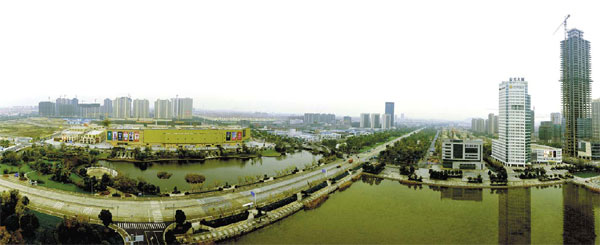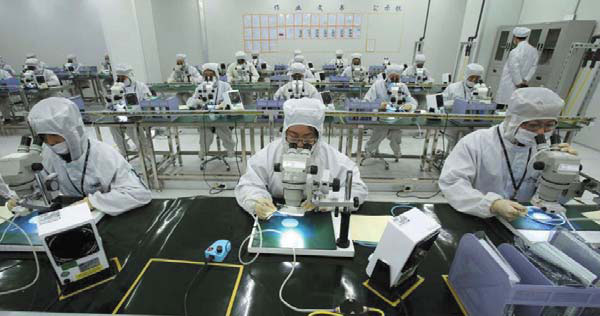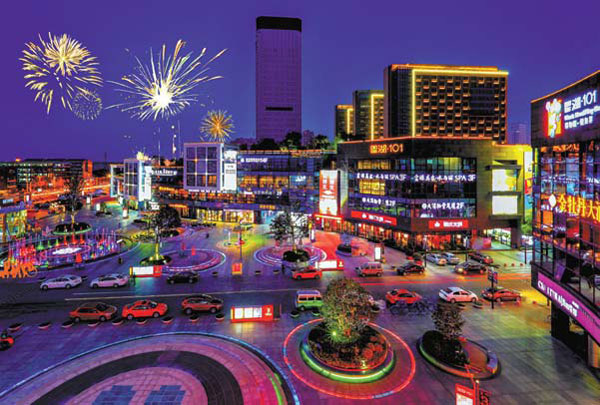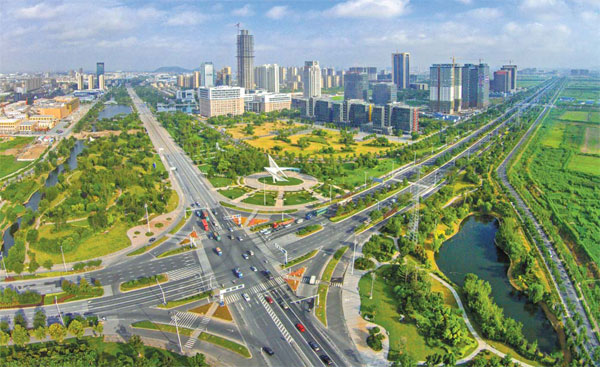Development zone helps drive Nantong's growth
Near Shanghai, NETDA offers talent pool and lower costs
Nantong Economic and Technological Development Area - also known as NETDA - has become one of the important business destinations for world-leading companies thanks to its good investment environment, convenient traffic network and well-trained manpower.
By the end of 2014, more than 800 companies from over 30 countries and regions had businesses in the area, including Tsinghua Tongfang from China, Sweden's Autoliv and Singapore's Hi-P International Ltd. More than 70 companies are on the Fortune 500 list.
Their businesses include electronics, modern equipment manufacturing, health technology, new materials, modern textile production and service outsourcing.
"We selected NETDA because of its convenient location as well as its good infrastructure and the efficient support from the local government," Zhong Xing, general manager of Tital (Nantong) Co Ltd, said in an interview with China Daily.
Tital is a German company that makes titanium and aluminum castings for aerospace, electronics, optics, and industrial and medical systems.
The local business administration department said $758 million in foreign capital is now registered with NETDA and actual incoming foreign capital hit $700 million in 2014.
As one of the first national-level development zones, NETDA has recorded strong growth in 2014 even amid a slowing national economy.
In 2014, the area's gross domestic product reached 44.19 billion yuan ($7.05 billion), an increase of 10.4 percent over the year previous.
Convenient traffic
Most companies said Nantong's well-connected transportation network was a major they chose it as an investment destination.
As one of China's first 14 economic development zones, NETDA is connected by three Yangtze River bridges, three expressways, three airports, two river ports and three railways.
The Suzhou-Nantong Yangtze River Bridge is centrally located in the area. About 100 kilometers from the estuary of the Yangtze, it links the area with the international metropolis Shanghai and the rest of southern Jiangsu province.
The 1,088-meter-long, cable-stayed bridge had the longest main span in the world until July 2012 when it was surpassed by the newly completed Russky Bridge in eastern Russia.
Construction on the Shanghai-Nantong Railway Bridgealso on the Yangtze - began last year and when complete will shorten travel time between the two cities from three hours to one hour.
Nantong is a 90-minute drive from Shanghai Pudong International Airport and an hour from Shanghai Hongqiao Airport.
Nantong Airport 15 kilometers from NETDA has regular flights to 19 domestic cities including Beijing, Dalian, Guangzhou and Qingdao. Authorities in Nantong said Nantong Airport might be selected as the third airport serving Shanghai.
Nantong's two river ports also strongly support the city's economic development and are considered a benefit by businesses.
The Nantong Port is a member of the International Shipping Association and a member port of the Shanghai International Shipping Center. With 38 berths and an annual cargo handling capacity of more than 200 million tons, it is among the top 10 largest ports nationwide.
It has established trade and shipping links with more than 300 ports in 70 countries and regions in the world.
It also neighbors Shanghai Port, one of the most important gateways for foreign trade in China.
Good service
Good service is another reason companies said they set up operations at NETDA. Compared to surrounding cities, companies in the development area have lower costs in human resources, facility rental, insurance and many other operations.
Nantong now has four power stations to provide non-stop electricity in different voltages based on company demands.
NETDA is the first development zone in China to have two water supply systems. The water cost per ton is the lowest among cities in Jiangsu and East China.
Other facilities in the area, including roads, gas and heat pipelines, rainwater and sewage treatment systems and telecommunications and TV networks, are also well equipped.
To better support the development of NETDA, the administration authorities divided the economic zone into several parks, each with a key feature.
Currently, there are five industrial parks specializing in precision machinery manufacturing, equipment manufacturing, health tech development, electronic products and new materials.
It also has three business zones to meet general business demands - Nengda Business Zone, a bonded zone and a zone for renowned brands.
Nengda Business Zone, with a planned area of 15 square kilometers, offers business services, research and development and sightseeing functions. It focuses on companies in software development, service outsourcing and creative industries.
The bonded zone started operation at the end of 2013 by learning from the Shanghai Free Trade Zone.
A total of 62 companies have registered in the bonded area with total investment of 5.2 billion yuan.
Authorities are also planning a series of reforms in customs services to ensure a better environment in the bonded zone. The administrators have introduced "negative lists" which provide a guide to companies about what they can do and what is not allowed.
The various online trading platforms in NETDA have played an important role in helping businesses enhance operational efficiency.
A petrochemical products trading platform launched in 2013 reported more than 5 billion yuan in income by the end of 2014.
The textile raw materials trading platform established in May 2014 has attracted more than 280 member companies and was recognized as a pilot import goods exchange center by upper-level administrative bodies.
NETDA's cross-border e-commerce platform recorded 10 exchanges in 2014.
Human resources
For most companies, stable and well-trained manpower is key when they consider an investment destination in China. Though Nantong's economic base is not as strong as neighboring Shanghai and Suzhou, its stable supply of qualified, cost-efficient labor attracts many domestic and international companies.
Nantong has six universities and 44 colleges that train talented personnel to fit different needs of companies. The city has 185,000 university students and can provide 50,000 graduates annually for industries. Graduates can serve companies in electronics, chemicals, computing, textiles, life sciences, foreign trade, finance and commerce.
Nantong is also trying to attract top talent to serve NETDA. In 2014, the area attracted 2,147 skilled professionals in a range of industries. It also attracted 71 top global talents.
In 2014, NETDA invested 2.45 percent of its GDP in research and development. Twenty-four of its companies have been recognized as national high-tech companies and three products developed onsite were recognized as national key new products.
Look forward, NETDA plans to grasp benefits provided in government development plans such as Jiangsu's costal city development plan and the Shanghai Pilot Free Trade Zone. As one of the oldest development zones in China, NETDA will have more resources and opportunities to support its growth, said officials.
|
One of the earliest development zones in the country, NETDA is home to operations funded by 800 multinational businesses, including 70 companies on the Fortune 500 list. Photos Provided to China Daily |
|
Backed by its rich talent pool from nearby universities and massive investment from the local government, NETDA has a strong capacity in research and development. |
|
The Nengda Business Zone offers investors both well-equipped offices and friendly neighborhoods for shopping and relaxing. |
|
At the heart of the Yangtze River Delta, the development area in Nantong is conveniently linked to the rest of the country by well-developed transportation facilities. |
(China Daily 03/16/2015 page12)












